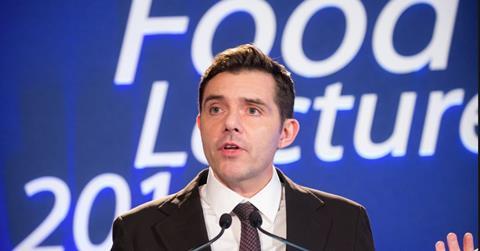
Technology will be intrinsically linked with food in future, with consumers taking more control and tracking everything they eat and drink.
That was the view of Christophe Jouan, chief executive of the Future Foundation, who delivered the annual City Food Lecture at London's Guildhall on Tuesday night.
Jouan crystal ball-gazed about what and how consumers will be eating in 2025. He predicted that technology such as calorie-counting products, wearable apps, smart fridges and a range of devices like Amazon Dash (a one-touch button to reorder everyday products) and Vessyl (an intelligent cup that monitors everything you drink) will become the norm as consumers look for as much information and control as possible.
For food producers, there are massive opportunities to partner with a flurry of tech start-ups and get involved in the digital food revolution, Jouan said, as the era of 'invisible shopping' takes hold. Invisible shopping is when devices or websites are set up to automatically reorder food and drink without intervention by the customer, even predicting what the user wants, making impulse shopping less common and more vital that producers get their products onto shopping lists.
'This is still embryonic but we are seeing massive developments,' Jouan explained. 'Tracking will be embedded in everything we do. We will get narratives about our lives [from our devices] and algorithms will predict our future consumption.'
Currently some 16 per cent of Brits use health-tracking apps, but that is set to rise to 32 per cent by 2025.
'Rebalancing the indulgence scale'
Consumers' guilt about what they eat will overtake indulgence as the prominent driver of eating habits, Jouan said. 'Indulgence is here to stay, but in a slightly more controlled way,' he added. 'It's about rebalancing the indulgence scale.'
Jouan also described a new breed of 'flexitarians' - consumers who will look to moderate their meat intake and see meat as more of an 'occasion'.
Currently, some 7 per cent of British consumers are vegetarians and vegans, 25 per cent never moderate their meat intake and the rest would fall broadly into the flexitarian group. This group will increasingly 'offset' their consumption by indulging occasionally and improving their diet at other times, in much the same way as the 5:2 diet.
While food is nothing more than fuel to a small minority, most people still enjoy the experience, and with more possibilities than ever to get quality food at home, restaurants will have to go the extra mile to offer unique experiences, according to Jouan.
'This is a very interesting world we live in, and there are lots of prizes [available] if you can grab them,' he concluded.



